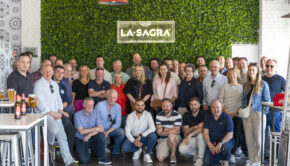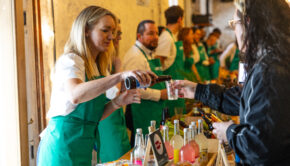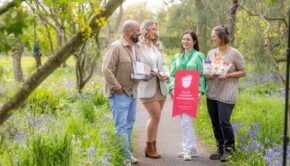Centra launches new campaign celebrating choice called ‘Choices Define Us’

New research reveals one in two Irish people feel their daily choices have the power to impact positively on society
28 April 2022
Centra is launching a new campaign that celebrates choices called ‘Choices Define Us’.
The campaign focuses on Centra’s position at the heart of communities all throughout Ireland with 481 locally owned and operated stores nationwide and the fact that “is committed to offering choice that meets the evolving needs of shoppers today and into the future”.
Understanding customers’ choices
“This is a defining time in our lives where people are making more considered choices than ever,” said Ray Kelly, marketing director, Centra.
“At Centra we take great care to understand what choices people are making and the impact that those choices will have on how people live, work, and eat so we can continue to adapt and evolve our retail offers and experiences to meet the needs of communities across Ireland.”
Period of revaluation
To mark the launch of this campaign, Centra commissioned an in-depth study to provide a deeper understanding of the choices people are making in Ireland in this period of revaluation, forced by the pandemic which revealed that one in two Irish people (46%) feel their daily choices have the power to impact positively on society. Through this campaign Centra is encouraging consumers to think about choice, and to choose wisely every day.
Dr. Maureen Gaffney, leading psychologist, and author, looked into the insights delivered by the study, noting: “This research shows that people are pondering on the value of what they are doing: Am I making the right choices about how I live and how I work? It is important to better understand the nature and importance of choice.”
“Although people value choice, they are aware that too much choice makes the process of decision making too difficult,” Dr. Gaffney continued. “The finding that making a good choice is made more difficult in certain conditions is consistent with psychological research findings that the act of making a choice, even a choice we like making, is cognitively taxing and uses up resources that we need for other kinds of thinking.”
Generational differences
The research also revealed that over half of people in Ireland reported that they worry that having made a choice, whether it is the right choice.
In contrast, older adults, although they like to have more choice options than younger adults do, are more assured about their decisions – most likely because they are more settled in their choices and buying patterns, and at a deeper level, are less inclined to fuss about what they see as less important in the great scheme of things. However, they also are more inclined to believe that society is more positively shaped by government initiatives rather than their own choices.
Performer and broadcaster Paul Ryder also reflected on the research during the launch event. “Our choices mean a lot more to us now because we didn’t have access to them over the last two years,” he said. “Now, we’re having to make the right choices for ourselves, family and friends as we move into a new era of life where our choices really do define us.”
Shopping locally
When asked to look at areas where people are currently making positive choices and indeed feel that others in the community should be encouraged to do so as well, shopping locally (95%) is something chosen by the vast majority of people.
“There is a clear recognition from this research that the local shop serves as a hub for the community,” Ray Kelly added. “We feel great pride and responsibility knowing that so many people choose to walk through our doors every day and we know that with the future of hybrid work that Centra will play an even greater role in many people’s lives as they choose to opt for more local amenities closer to home. We are committed to giving our customers the best choice every day.”
At A Glance: Key findings from the report:
- SOCIETY: While one in two Irish people (46%) feel their daily choices have the power to impact positively on society, one in three (33%) feel that society is more positively shaped by Government initiatives and policy changes. Older adults tend towards a view of Government being more important, whereas younger adults emerge as more idealistic – believing in their personal influence.
- SUSTAINABILITY: The research also points to an increase in awareness of the environment and sustainability and people are already making very conscious choices to minimise buying products with excessive packaging. 87% claim to be much more mindful about what they buy, to compost and reduce food waste (79%).
- COMMUNITY: While 66% say they are contributing positively to their community just 29% say that they are contributing time to volunteer work. Interestingly, in respect of contributing time to volunteer or community work it was strongly linked to the arrival of children in many instances. Expanding family size tends to prompt parents to engage with others in the community and sports groups.
- EFFECTS OF THE PANDEMIC: The survey provides valuable data on particularly adverse effects of the pandemic on younger people. Many are feeling overwhelmed at the prospect of setting up their life, securing a job and affordable accommodation. Difficulty accessing psychological help and support is now an issue for those in more urgent need. Those with jobs and employers are also facing difficult choices about the more long-term implications of managing remote or hybrid working arrangements.
- WFH: Problems that preceded the pandemic are now firmly back in focus – including the lack of reliable public transport and increasing rents. There is uncertainty about the future of cities and city centre businesses if large numbers of people opt to work from home.
- NATIONAL DISCOMFORT: The research also surfaced a national discomfort with the idea that we have to prioritise or choose one marginalised group over another. Although there are different weightings of causes or issues in society this is purely in the context of having to make a choice and most people do not want to choose between issues that matter to them.
The Centra Choices campaign which is now live, encompasses TV, audio, out-of-home (OOH), cinema, podcasts, PR and social.



 Print
Print






Fans 0
Followers